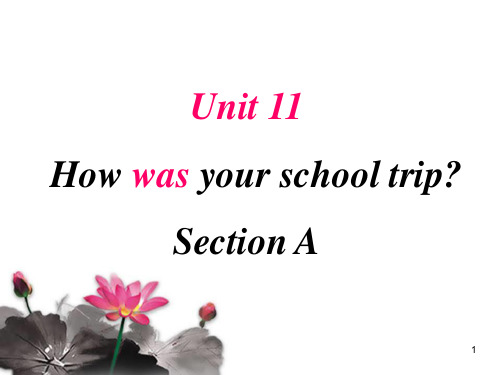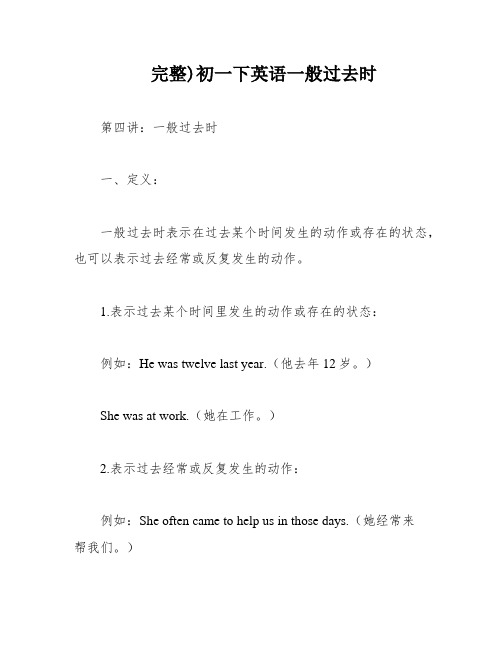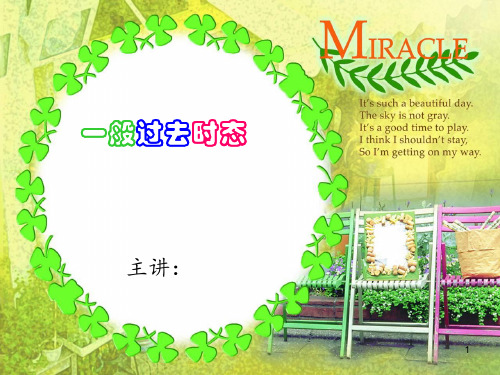一般过去时七年级英语课件
初中英语人教版七年级下册微课课件

A: What did ___ you do yesterday? B: I _____ went to the movie.
A: What did ___ you do last weekend? B: I did ___ my homework.
What did you do ___ last weekend? We ____________________ visited the fire station. How was ___ your trip last weekend? It was boring. do last weekend? What did they ___ Theypicked ______________________ some strawberries. How were ____ the strawberries? They were delicious.
地点 Where did she work last year?
主语 Who worked in a hospital last year?
every day yesterday
• I get home at 5:00 every day. I got home at 5:00 yesterday. • Jack sees a movie every day. Jack saw a movie yesterday. • She buys lunch in the shop every day. She bought lunch in the shop yesterday. • There are many people in our school every day. There were many people in our school yesterday.
一般过去时(7张PPT)初中英语专项复习课件

易错点:
稿定PPT
(1)表示一系列的动作,尽管有先后,都稿用定一PP般T过,去海时量,素最材后持两续个动词之间用and连结。 He opened the door, rushed out and then disa更 总pp新 有ea, 一red上 款. 他千 适打款 合开模 你门板,选冲择了出去,然后就消失了。 (2)注意在语境中理解"我刚才/原来还不……"。
感谢观看
一般过去时 初中英语专项复习
一般过去时 构成:一般过去时用动词的过去式构成,其规则动词变化方法如下表所示:的状态。
情况 一般情况 以不发音的字母e结尾
以辅音字母 +y结尾
结尾只有一个辅音字母的重 读闭音节
构成方法
例词
加-ed
wash→washed help→helped
稿加定-PdPT
hope→hoped like→liked
一般过去时 (5)一般过去时有时可以表示现在,多与 want, hope, wonder, think, intend 等动词连用,使语气更委婉 。
I wondered if you could help me. 不知你能不能帮我一下。 有时用一般过去时也是时态一致的需要。 I didn’t know you were here. 我不知道你在这里。
He was here just now. 他刚才还在这里。 What did you do yesterday? 你昨天做了什么事?
(2)在过去一段时间内的经常性或习惯性稿动定作PP。T 稿定PPT,海量素材持续
We often played together when we were child更re新n.,我上们千小款时模候板常选在择一起玩。 总有一款适合你
英语时态8种基本时态讲解.ppt课件

8.过去完成时 表示动作发生在过去某一时间之前已经完成的动作或状态, 强调“过去的过去”, 常与 by the time, by the end of…,before , by 等引导时间的状语连用。
基本结构 主语+ had + 动词过去分词 + 其他成分 When I got to the cinema yesterday the film had begun already. He had learned English before he came here.
现在完成时与一般过去时的区别: 1)现在完成时侧重于对现在的影响;而一般过去时侧重于某一动作发生在过去某个时间或某段时间。即现在完成时侧重于现在的结果,而一般过去时侧重于动作发生的时间。例如:
I have seen the film. 我看过这部电影。(现在我仍记得电影的内容) I saw the film three days ago. 三天前我看了这部电影。(强调是三天前,而不是别的什么时候看的电影)
be going to含有“打算,准备”的意思,而will则没有这个意思, She is going to lend us her book. He will be here in half an hour.
be about to+V.原形(意为马上做某事,在时间上指最近的将来) I am about to leave school. 不能与表示时间的副词连用。 They are about to set out.(√) They are about to set,变y为i加-ed. study----studied carry----carried cry----cried try----tried d)以元音字母+y结尾的单词直接加-ed. play----played stay----stayed
初中英语六种时态复习课件(35张PPT)

②while 引导的从句表示“在……期间”,主从句谓语动词所表示的动 作同时ቤተ መጻሕፍቲ ባይዱ生。这时,主从句都用过去进行时。
e.g.:My father was reading the newspaper while my mother was watching TV.当我的妈妈看电视的时候,我的爸爸正在看报纸。
(2)表示普遍真理或客观事实。 e.g.:The sun rises in the east.太阳从东方升起。 (3)在条件状语从句和时间状语从句中,用一般现在时表示将来。 e.g.:If it doesn't rain tomorrow,we will go for a picnic.如果明天不下 雨,我们将去野餐。 (4)在某些以 here,there 开头的句子中用一般现在时表示正在发生的动作。 e.g.:There goes the bell.铃响了。
(3)现在进行时表示将来 表示位置移动的动词 go,come,leave,fly,start,meet,move 等, 可以用现在进行时表示将要发生的事。 e.g.:We are leaving for London.我们就要动身去伦敦了。
(4)一般现在时表示将来 ①表示按规定或时间表预计要发生的动作。 e.g.:Our plane takes off at 8:10.我们的飞机 8:10 起飞。 ②当主句为一般将来时,或含有情态动词,或是祈使句时,在 if,as soon as,until,when 等引导的状语从句中用一般现在时表示将来。 e.g.:I will give him the book as soon as he comes here.他一来这儿, 我就把这本书给他。
(2)表示当前一段时间内的活动或现阶段正在进行的动作。 e.g.:They are picking apples on a farm all the time.他们一直在农场 摘苹果。 (3)与 always,usually 等词连用,表达说话人强烈的感情,如赞扬、不 满、讨厌等。 e.g.:Mary is always thinking of others instead of herself.玛丽总是为 别人着想,而不为自己着想。
初中英语一般过去时课件(PPT)

did
don’t/ doesn’t
She doesn’t play basketball after school. She _________ basketball after school yesterday.
do/ does
didn’t
did
didn’t watch
didn’t play
一、句型转换 1. The children had a good time in the park. 否定句:The children did not have a good time in the park. 一般疑问句:Did the children have a good time in the park? 对划线部分提问:Where did the children have a good time? 2. There were about nine hundred people at the cinema. 否定句:There were not about nine hundred people at the cinema. 一般疑问句:Were there about nine hundred people at the cinema? 对划线部分提问:How many people at the cinema?
Did
Did
go
go
规则变化 1.一般加ed
2.以e结尾加d
3.末尾只有一个辅音字母的重读闭音节词,先双写这个辅音字母,再加ed .
work —
worked
change —
changed
prefer —
preferred
stop —
一般过去时(12张PPT)初中英语专项复习课件

一般过去时 初中英语专项分析
一般现在时 de 应用场景
过
动作行为
去
发
生
曾经
的
存在的状态
识别 标志词 理解 句意
答题技巧
熟练 动词 转换
yesterday last week 3 days ago
动词 过去式
熟练 句型 转换
肯定 否定 疑问
一般 过去时 He played basketball yesterday.
yesterday? Yes, I did. No, I didn’t.
动词 过去式 形态的变化
一般
直接加 ed
二般
以 e 结尾,去 e 加 ed live dance hope use
动词 过去式 形态的变化
三般
重读辅元辅,双写尾字母
stop plan
四般
辅音字母 + y 结尾,把 y 变 i 加 ed cry study worry
标志词
时间状语:last night, yesterday, the day before yesterday last week, some years ago in 1995, the other day, just now, in the past
Unit7一般过去式课件牛津深圳版七年级英语上册

The simple past tense
❖ I was 8 years old five years ago. ❖ I studied in a primary school last year. ❖ I did my homework yesterday. ❖ I had some milk and bread for breakfast this
in the past
Miss Tan, teach us English
Miss Tan taught us English in the past.
five minutes ago
John, put
John put the book on the desk five minutes ago.
1) 去年我没有参观长城。 Last year I ___d_id_n_’t___ ____v_is_it____ the Great Wall. 2) 上周末我待在家里。 I __s_ta_y_e_d_ ___a_t __ __h_o_m__e_last weekend. 3)刚才你做了什么? What ____d_id____ you ____d_o____ just now? 4)昨晚爸爸教我如何做模型飞机。 My father __ta_u_g_h_t__ me __h_o_w___ ___to____ make a plane. 5)刚才我走过他房间的时候,看见他在读书。
stop stopped dial dialled
infinitive be break buy can come cost teach drive fall get give hear
simple past was/were broke bought could came cost taught drove fell got gave heard
一般过去时(课件)

一般过去时(课件)一般过去时是英语中表达过去某个时间点或时间段发生的动作或状态的一种时态。
在一般过去时中,动词的形式需要根据主语的人称和数进行变化。
一般过去时的句型结构是:主语 + 动词过去式 + 其他。
一、一般过去时的构成1. 规则动词:在动词原形的基础上加上ed。
例如:work → worked, play → played, study → studied。
二、一般过去时的用法1. 表示过去某个时间点发生的动作。
例如:I went to the library yesterday.2. 表示过去某个时间段内发生的动作。
例如:We playedfootball last weekend.3. 表示过去某个时间段内的状态。
例如:She lived in New York for five years.4. 表示过去习惯性动作。
例如:He used to smoke when he was young.三、一般过去时的疑问句和否定句1. 疑问句:将助动词did放在主语之前,动词原形放在助动词之后。
例如:Did you watch the movie last night?2. 否定句:在主语和动词之间加上助动词did,动词原形变成动词的过去式,并在动词过去式前加上not。
例如:I didn't finish my homework yesterday.四、一般过去时的特殊用法1. 过去进行时:表示过去某个时间点正在进行的动作。
例如:What were you doing at 8 o'clock last night?2. 过去完成时:表示在过去某个时间点之前已经完成的动作。
例如:I had finished my work before he came.3. 过去完成进行时:表示在过去某个时间点之前一直在进行的动作。
例如:She had been waiting for two hours when he finally arrived.一般过去时(课件)一般过去时是英语中表达过去某个时间点或时间段发生的动作或状态的一种时态。
英语语法——一般过去时课件(共44张PPT)

肯否回答:
一般疑问句: Be动词(was/were)+主语+其他+?
肯定回答:Yes , 主语+ was/were. 否定回答:No , 主语+ wasn’t/weren’t . --- Was he at home yesterday ? ---他昨天在家吗? --- Yes , he was .是的,他在 --- No , he wasn’t . 不,他不在。
study — studied
carry— carried
5.不规则变化. (见不规则动词表P97)
be动词 的一般过去时
Please look at the sentences
我今年12岁. I _a_m_ 12 years old this year.
我去年11岁. I _w_a_s_ 11 years old last year.
实意动词的一般 过去时句子结构
每天,早餐我吃鸡蛋和牛奶。 I _h_av_e_ eggs and milk for breakfast every morning.
昨天,早餐我吃面条。
I _h_a_d_ noodles for breakfast yesterday morning.
他每天都吃水果。 He _h_a_s__ fruit every day.
1. I _______ at school now.
was 2. He ________ at the camp last week. were 3. We ________ students two years ago. were 4. They ________ on the farm a moment ago. was 5. Yang Ling ________ eleven years old last year. was 6. There ________ an apple on the plate yesterday. was 7. There ________ some milk in the fridge yesterday. was 8. The mobile phone _______ on the sofa yesterday evening.
人教版初中英语七年级英语下Unit11全单元课件

went for a walk
milked a cow
rode a horse
fed chickens
talked with a farmer took some photos
1. Did you see any cows? Yes, I did. I saw quite a lot.
quiet a lot (相当多)+of+可数或不可数, 也 可以单独使用。 quite a little 相当多+不可数名词 quite a few 相当多+可数名词
2b Listen again. Circle T for true or F for false.
1 The farmer showed Carol around the farm. T F
2 Carol learned a lot about farming. T F
3 The farmers grow strawberries from December
Did he/she......yesterday? Yes, he/she did. No,he /she didn't.
watch the stars play tennis
1b Listen and circle the three things Carol did on her school trip in 1a.
2020年6月23日
7
二、一般过去时的结构(可分三类不同的结构)
1. Be动词的一般过去时
am/is ---was are---were
(1)肯定句式:主语 + was / were + 其它.
(2)否定句式:主语 + wasn’t /weren’t+ 其它.
完整)初一下英语一般过去时

完整)初一下英语一般过去时第四讲:一般过去时一、定义:一般过去时表示在过去某个时间发生的动作或存在的状态,也可以表示过去经常或反复发生的动作。
1.表示过去某个时间里发生的动作或存在的状态:例如:He was twelve last year.(他去年12岁。
)She was at work.(她在工作。
)2.表示过去经常或反复发生的动作:例如:She often came to help us in those days.(她经常来帮我们。
)Mrs。
Peter always carried an umbrella.(彼得太太总是带着伞。
)二、常与一般过去时连用的词:1.时间状语ago(two hours ago(一段时间+ago)yesterday(morning。
afternoon。
evening)the day before yesterdaylast week。
last year。
last night。
last month…具体时间(如Jan。
fourth)just nowat the age of 10(过去时间段)one daylong agoonce upon a timethis morning(afternoon。
evening) long long ago(很久以前)the other day(前几天)at the moment三、一般过去时的构成1、系动词be的一般过去时构成:主语+be(was。
were)+其他主语是”I”时-----was主语为单数时-----was主语为复数及you时-----were否定句的构成:主语+be + not+其他was not = wasn’twere not = weren’t活学活用】填入适当的be动词。
1、Kitty was an English girl.(基蒂是一个英国女孩。
)2.Was it cold in your city yesterday?(昨天你们的城市冷吗?)3、I was not from Taizhou.(我不是来自台州。
初中英语语法—时态(28张) PPT课件 图文

(4)现在完成时与表示一段时间的for短语、since短语或从句等 时,应注意句中的谓语动词须是延续性的,而不能是非延续性动词,如 come→be here,go→be there,die→be dead,borrow→keep,buy→h ,join→be in,leave→be away,begin to study→study等。
6.过去进行时
(1)概念:表示过去某一时刻或某一时间段内正在进行的动作。 (2)构成形式:was/were+动词的-ing形式 ①表示往返、位移的动词的过去进行时常可用来表示过去将来时
时态 We wanted to tell her that the train was_leaving an hour later.
1.一般现在时
基本用法: (1)表示经常性、习惯性的动作; He always helps others. 他总是帮助别人。
时态 (2)表示现在的情况或状态;
He is a teacher. 他是个老师。 (3)表示客观事实和普遍真理。 The sun rises in the east. 太阳从东边升起。 构成形式:am/is/are或实义动词的原形(主语是第三人称单数时,动 词要用第三人称单数形式)。
时态 (2)构成形式:have/has+动词的过去分词。
(3)与现在完成时连用的时间状语有for a long time,recently,yet, lately,ever,never,already,since,by this time,before,just,in t past/last few years,since+过去的时间点,since+时间段+ago,since +从句(一般过去时)。
表示感觉的动词。如:see,hear等。 表示喜欢或厌恶的动词。如:like,love等。 表示希望的动词。如:want,would like等。
初中英语-一般过去时-教学完整ppt课件

完整版PPT课件
14
05
句型
完整版PPT课件
15
否定句
在动词过去式前+ didn’t, 再把动词变回原形。如: I didn’t wgeont to school by bus yesterday.
在动词为be的一般过去时句子中,在 was/were 后面+ not 如: They were not happy last night.
完整版PPT课件
6
一般过去时结构
主语+动词过去式+其他+(时间状语) 例句:He read a book yesterday.
完整版PPT课件
7
变形
1. 一般在词尾直接+ed,如:play---played 2. 以不发音的 e 结尾的动词,词尾+ -d,如:live---lived 3. 以辅音字母 y 结尾的动词,把 -y 变成 -i ,再加 –ed,
Too. I am busy but happy on the weekend.
完整版PPT课件
13
Last Weekend I g_o_t_u_p_(get up) early last weekend. Then I _p_l_a_y_e_d (play) sports. I _h_ad_(have) milk and bread for breakfast. On Saturday morning, I _r_ea_d_ (read) some books and w__a_tc_h_ed(watch) TV. In the afternoon, Id_i_d_(do) housework. I c_o_o_k_e_d(cook) dinner for my family in the evening. On Sunday, I w__e_nt (go) shopping with my friends. I c_le_a_n_e_d (clean) my room, too. I w__a_s (am) busy but happy on the weekend.
初中英语语法——四大基本时态课件(共24张ppt)

现在进行时使用环境、句型变化
★作谓语的动词用来表示动作(情况)发生时间的 各种形式称为时态。
★概念:表示现阶段或说话时正在进行的动作及行 为。
★时间状语:Now, at this time, days, look. listen等时 间状语做标志。
★基本结构:主语+be +doing +其他 ★否定形式:主语+be +not +doing+其他 ★一般疑问句:把be动词放于句首。
事,正要做某事。 ⑤某些动词,可用进行时态表将来,如come,
现在进行时的用法
1)、现在(说话的瞬间)正在进行或发生的动作,强调“此时此刻” E.g. He is reading . They are talking now.
2)、当前一段时间内的活动或现阶段正在进行的动作。 E.g. They are working these days.
3)、 某些动词的现在进行时,表预定的计划或即将发生的动作。 E.g I am coming.
一般现在时--句型变化
❖ ③含有be动词的要在be上做变化.
❖
Danny is a good student. 陈述句
❖
丹尼是个好学生。
❖
Danny isn't a good student. 否定句
❖
丹尼不是个好学生。
❖
Is Danny a good student? 一般疑问句
❖
丹尼是个好学生吗?
此句中给出的do指“做,干”, not指把此句变为否定句, 故须在do前加助动词don't。
做题时常见错误五、对主语的数判断有误
一般过去时(复习)公开课PPT课件

以辅音字母+y结尾的动词,把y变为i 再加-ed,如:study—studied。
以不发音的e结尾的动词,动词词尾 加-d,如:live—lived。
以一个辅音字母结尾的重读闭音节动 词,双写词尾辅音字母,再加-ed, 如:stop—stopped。
创造英语环境
在日常生活中尽量使用英 语,提高英语的实际运用 能力。
鼓励学生在日常生活中运用一般过去时
记录日常活动
用英语记录自己一天的活 动,使用一般过去时描述 过去发生的事情。
讲述经历
和同学或家人分享自己的 经历,使用一般过去时讲 述故事。
看图说话
选择一张图片,使用一般 过去时描述图片中的人物 和事件。
通过给出句子和选项,让学生选择正确的动词过去式完成句子。
改写句子
提供现在时的句子,要求学生将其改写为一般过去时。
连词成句
给出打乱顺序的单词,让学生重新排列并加上适当的标点符号,形 成语法正确、意思完整的句子。
小组讨论并分享经验
分组讨论
学生分组,每组围绕一个与一般过去时相关的话题展开讨论,如“你昨天做了什 么?”或“你曾经去过哪些地方?”。
常见误区及注意事项
不规则动词的过去式需要特殊记忆,不能简单地加-ed,如:go—went, eat—ate等。
在使用一般过去时时,要注意动词的过去式与过去分词的区分,避免混 淆。
在表达过去发生的动作时,要注意时间状语的正确使用,确保时态的一 致性。
03
一般过去时在句子中运用
陈述句中使用一般过去时
讲解一般过去时在各种句式中的 表达方式,如肯定句、否定句、 疑问句等,并给出相应的例句。
一般过去时ppt课件

行为动词的一般过去时
(1)肯定句 :主语+动词的过去式+… He played tennis last week.
(2) 否定句 : 主语 +did not+ V原形 +… week.
He did not play tennis last
(3)一般疑问句 :Did + 主语 + V原形 +….. Did he play tennis last week ?
He wasn’t…
一般疑问句 Is he …?
Was he…?
特殊疑问句 疑问词+is he … ? 疑问词+was he …?
12
• 名词变复数(第3人称单数),过去式,V-ing 形式, • “y”后变化口诀:
“元音字母+y” , 直接加, “辅音字母+y,” 去掉它 , “y后面的-ing,” 随便加。
餐我吃面条。)
didn’t have
I did not have eggs and milk for breakfast yesterday
morning.(昨天早餐我没吃面条。)
He did his homework yesterday evening.(昨天晚上他做家庭 作业。)
He did not do his homework yesterday evening.
22
Li Ming studied English this morning.
(变成一般疑问句)
Did LiMing study English this morning ? (李明今天早晨学英语了吗?)
Did LiMing studied English this morning? 行为动词用原形
- 1、下载文档前请自行甄别文档内容的完整性,平台不提供额外的编辑、内容补充、找答案等附加服务。
- 2、"仅部分预览"的文档,不可在线预览部分如存在完整性等问题,可反馈申请退款(可完整预览的文档不适用该条件!)。
- 3、如文档侵犯您的权益,请联系客服反馈,我们会尽快为您处理(人工客服工作时间:9:00-18:30)。
is/am-_w__a_s___ are-__w__e_r_e_ hurt-__h_u_r_t__ think-_t_h_o_u_g_h_t buy-_b_o_u_g_h_t_ meet-_m_e_t____ have-__h_a_d___ drive-_d_r_o_v_e_ write-_w_r_o_t_e__ eat-__a_te____ go-_w_e_n__t ___ find-_f_o_u_n_d___ do-__d_id____ fly-_f_l_e_w___ come-_c_a_m__e__
(他们停止踢足球)
时态意义Βιβλιοθήκη 一般现在时 表示现在习惯 或经常反复 发生的动作
现在进行时 一般过去时
表示现在正在 进行或发生 的动作
表示过去发生 的动作或存 在的状态
结构
标志词
主语+V(原形)always, usually, 主语(三单) often, sometimes,
+V-s/V-es
every day (week,
Unit 4 语法复习 :一般过去时态
唐山49中学 七年级
Welcome!
学习目标:
知识目标:1)复习巩固一般过去时态及与其相关 的各种句式结构。
2)熟练运用已学过的三种时态。
技能目标:通过运用一般过去时态培养学生听 说读写能力。
Listen and fill in blanks:
I am an English teacher in a middle school. There are twenty-one boys and twenty-seven girls in my class. I love my students. We take many trips every year. We__h_a_d__a great trip to Beijing last weekend. It__w_a_s__the first or second visit to Beijing for the students, so they_w__e_r_e_ very excited. We_v_is_i_te_d_a lot of places and __a_t_e__many special snacks there. We also _t_o_o_k__many pictures. Everyone had fun in Beijing. On the way home, everyone was tired, but we were all very happy.
Danny , Jenny, Li Ming and Mrs. Li g_o_t_____ on the train to Beijing on Monday. On the first day, they w_en__t _____ to Tian’anmen Square. Danny h_u_r_t___ his arm. The second day, they t_o_o_k___ many pictures at the Palace Museum. Danny f_e_ll____ and b_ro_k_e____his tail. But they all ha_d_____ fun in Beijing.
/t/, /d/后面读/__id___/.
规则动词词-ed的读音
清念 /t/ ,元浊/d/ ; /t/ /d/ 之后念/id/
说明: 1、清念 /t/ ,即 ed 在清辅音后面念 /t/ ,例:finished helped
passed cooked 2、元浊 /d/ ,即 ed 在元音,浊辅音后面念 /d/ ,
动词过去式 的构成
规则动词 不规则动词
构成 读音
在一般过去时句子中,谓语动词要使用动词 __过__去__式___形式,大多数动词过去式由 __动__词__原__形__+_e_d_构成,这种动词称为__规__则____动词。 规则动词过去式的构成:
1. ___+_e_d_____ 如:want-wanted/id/ need-needed/id/ open-opened/d/ play-played/d/
this morning
last night
yesterday morning
two days ago
be at home , just now
归纳总结: 一般过去时态的定义:表示在___过__去__时__间____发生的动作
或存在的状态。
标志词:
____y_e_s_t_e_r_d_a_y_, _la_s_t_w__e_e_k_,_…__a_g_o_,_j_u_s_t _n_o_w_,_i_n__2_0_0_0 构成:主语+ __动__词__过__去__式________ +其它。
week.
9. —___D_i_d___ Danny__h__a_v_e_f_u_n____(过得愉快)in Beijing?
—Yes, he did.
10. They _s_t_o_p_p_e_d__p_l_a_y_i_n_g__f_o_o_t_b_a_llwhen it began to rain.
4. “Where __w__e_r_e__ (be) you just now?”
“I __w__a_s__ in the library.”
5. He lived(live) in Beijing in 1998. 6. We __w__a_l_k_e_d__(步行)to school yesterday morning. 7. He __b_o__u_g_h_t___ (买)a gift for you two months ago. 8. Danny _b_r_o_k__e(弄断) his tail at the Palace Museum last
2. ___+_d______ 如:named/d/ liked/t/ loved/d/
3. __y___i_+_e_d__ 如:study-studied worry-worried
4. __双__写__+_e_d__ 如:stop-stopped plan-planned 发音顺口溜:清读__清_____,浊读__浊_____,
1. A: I __w_a__s_ thirteen years old last year. (be) B: I ___w_a_s_ n__o_t___thirteen years old last year. (变否定句) C:__W__e_r_e__y_o_u_thirteen years old last year? (变一般疑问句) D:Yes, ___I___w_a_s____./ No, ___I__w_a_s_n_’_t__. (做肯/否定回答
month)
主语+
now, look, listen,
(am/is/are)+ at this moment,
V-ing
these days,
主语+动词过 yesterday, last year,
去式
in 2000, just
now, …ago.
• 时态综合练习:
• 1.— __D_i_d___ you _t_e_l_l _ (tell) Tom about the party?
take-_t_o_o_k__ leave-_l_e_ft__ break-_b_r_o_k_e__
fall-__fe_l_l____ put-_p__u_t___ make-_m__a_d_e__ tell-_t_o_l_d___ get-__g_o_t___ see-_s_a_w____
Exercise Bar: hurt-__h_u_r_t _ stay-__st_a_ye_d_ are-__w_e_re__ eat-__a_te___ do-__d_id___ fly-__f_le_w__ plan-_p_l_an_n_e_d fall-__fe_ll___ am/is-__w_a_s_
巩固练习:
1. My father __a_r_r_i_v_e_d__(arrive) home yesterday.
2. He fell at the bus stop. He __h_u_r_t____(hurt) my arm.
3. I ___h_a_d___ (have) a great trip in Beijing last week.
否定句句式:主语+___w_a_s_n_’_t___/__w__e_re_n__’t___ +表语。 主语+ ____d_i_d_n_’_t _+______动__词__原__形____ +其它。
疑问句句式:__W__a_s____/____W__e_r_e__+主语+表语? _____D_i_d__+主语+____动__词___原__形_____ +其它?
but hed_i_d_n_’_t _h_a_v_e___ (not have) one last week. • 6. They __fo_u_n_d__ (find) a sick bird in the park
yesterday.
课堂检测:
A week ago, Li Ming i_n_v_it_e_d__Danny and Jenny to come on a trip to Beijing. Danny and Jenny a_r_ri_v_e_d_in Shijiazhuang on Friday, January 29th and they st_a_y_e_d___with Li Ming’s family for two days. Li Ming p_la_n_n_e_d_for their trip to Beijing.
